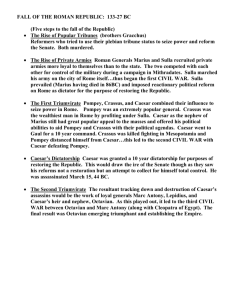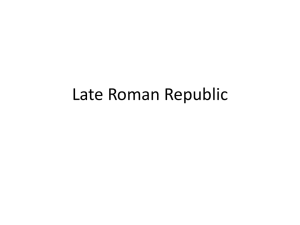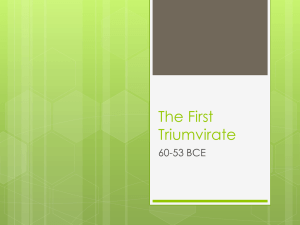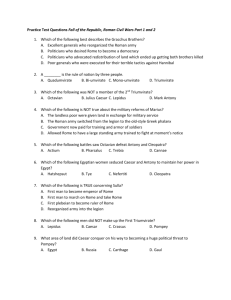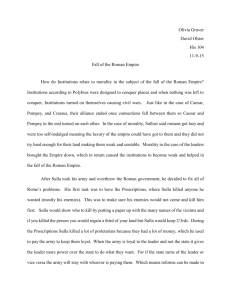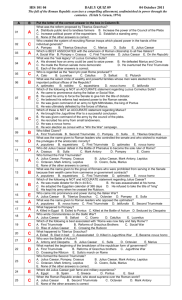Cassie Baker - 2010
advertisement
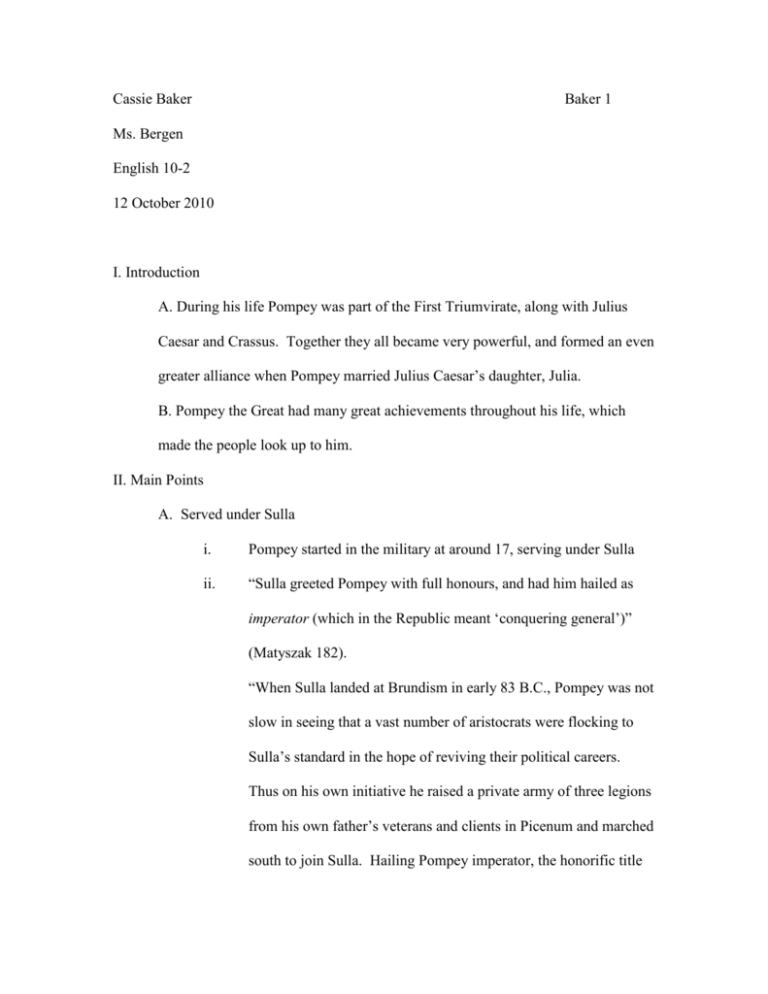
Cassie Baker Baker 1 Ms. Bergen English 10-2 12 October 2010 I. Introduction A. During his life Pompey was part of the First Triumvirate, along with Julius Caesar and Crassus. Together they all became very powerful, and formed an even greater alliance when Pompey married Julius Caesar’s daughter, Julia. B. Pompey the Great had many great achievements throughout his life, which made the people look up to him. II. Main Points A. Served under Sulla i. Pompey started in the military at around 17, serving under Sulla ii. “Sulla greeted Pompey with full honours, and had him hailed as imperator (which in the Republic meant ‘conquering general’)” (Matyszak 182). “When Sulla landed at Brundism in early 83 B.C., Pompey was not slow in seeing that a vast number of aristocrats were flocking to Sulla’s standard in the hope of reviving their political careers. Thus on his own initiative he raised a private army of three legions from his own father’s veterans and clients in Picenum and marched south to join Sulla. Hailing Pompey imperator, the honorific title Baker 2 traditionally bestowed on a victorious general by acclamation of his troops, Sulla ordered the tyro general north to clear Gallia Cisalpina of the Marians. On Sulla’s victory outside the walls of Rome, his surviving opponents fled overseas, so Pompey was ordered to Sicily with six legions and a senatorial grant of extraordinary imperium pro praetore” (Fields 47). iii. iv. Pompey wanted to impress Sulla a. Formed his own army and joined Sulla b. Was granted a high ranking Started serving under Sulla at a young age after he impressed him by forming an army and joining him. B. Had three triumphs i. Returned home in triumph three times ii. “When Crassus and Pompey returned from this triumph they did not, as the Senate wished and law required, disband or disarm their troops at the gates. Camping outside the walls, they asked permission to stand for the consulate without entering the cityagain a violation of precedent; in addition Pompey demanded land for his soldiers and a triumph for himself” (Durant 138). “He had achieved a triumph almost before a beard” (Durant 138). “But before he could think of claiming the triumph he had earned, he was summoned to Italy by the senate to perform a further task, Baker 3 the execution of which was to have far-reaching consequences” (Seager 36). iii. iv. Pompey had three triumphs however: a. He might have demanded one b. Or he might have actually earned one Whether he earned the triumphs or not he still got them. He also was called back right away to fight somewhere else. C. First Triumvirate with Caesar and Crassus i. Formed an alliance with Caesar and Crassus ii. “Rebuffed, Pompey formed the First Triumvirate with his rivals, Crassus and Julius Caesar, marrying Caesar’s daughter to cement the alliance” (Rodgers 50). “In 59, his Asian settlement still unratified and his veterans without land, Pompey needed allies. He found them in Crassus and Caesar. The three men formed what a contemporary called the ‘three-headed monster’, known today as the first triumvirate” (Matyszak 186). “There had been much discussion about when the coalition between the two was formed, and who took the initiative. Most ancient sources date it to the time when Caesar was standing for election and give him the major role. But the negotiations were deliberately kept secret and there is no way of deciding. In any Baker 4 case it was an obvious move from both men’s points of view, but as Crassus would naturally be supporting Caesar, Pompey may have been reluctant to approach him directly. Caesar, however, undertook the task of reconciling the two rivals, and the result was the coalition which has become known as the first triumvirate” (Leach 121). iii. iv. When the triumvirate formed: a. They were all rivals at first b. Caesar convinced the other two c. Pompey married Julia to seal the deal Forming the triumvirate was good because it gave them all great power. Then tension started building up which is not good in an alliance. D. Pompey died as he landed in Egypt i. After losing, Pompey left to go to Egypt, but was killed as he came ashore ii. “However, in August 48 B.C. he was decisively defeated at Pharsalus and, fleeing to Egypt, was killed as he stepped ashore” (Rodgers 50). “The Egyptians were less than happy with the dilemma posed by Pompey’s arrival. It was decided that it would be better if Pompey did not disembark in Egypt at all, and he was assassinated while Baker 5 transferring from his ship to a boat to take him ashore” (Matyszak 190). iii. After Pompey lost a battle he fled: a. To Egypt not realizing the Egyptians had already sided with Caesar b. Ended up getting his head chopped off as he stepped ashore iv. When he arrived in Egypt he had no idea what was about to happen to him. III. Conclusion A. Pompey started at a young age in the military under Sulla B. Was given three triumphs C. Formed the First Triumvirate with Caesar and Crassus D. Was killed as he fled to Egypt and came ashore E. Therefore because of Pompey’s great achievements the people looked up to him. Baker 6 Works Cited Durant, Will. Caesar and Christ. Nineteenth ed. Vol. III. New York: Simon and Schuster, 1944. The Story Of Civilization. Fields, Nic. Julius Caesar. Great Britain: Osprey, 2010. Leach, John. Pompey the Great. London: Croom Helm, 1978. Matyszak, Philip. Chronicle of the Roman Republic. London: Thames & Hudson, 2003. Rodgers, Nigel, and Hazel Dodge. Roman Empire. New York: Metro, 2008. Seager, Robin. Pompey the Great: a Political Biography. Oxford: Blackwell Pub., 2002.
